Another batch of originals, looking at Homeward Bound, Hurting Each Other, Blame It On The Boogie, Istanbul (Not Constantinople) and Rose Garden.
.
Chad & Jeremy – Homeward Bound.mp3
Simon & Garfunkel – Homeward Bound (live).mp3
 In 1965, Chad & Jeremy were a popular English folk-rock duo when Jeremy Clyde met the songwriter of promising newcomers Simon & Garfunkel at a party for Bob Dylan. Paul Simon was delighted to be asked to play some of his songs for the folk star, and proceeded to play 18 tracks, many of them future classics. One song in particular, Homeward Bound, appealed to Jeremy, and he recorded it with Chad Stuart in London on 26 November 1965 (with Simon dropping in during the session). A few weeks later, in December, Simon & Garfunkel got around to recording their own version of the song which Paul Simon had started writing while stuck at Widnes station (or Dutton or Wigan, accounts vary) in northern England.
In 1965, Chad & Jeremy were a popular English folk-rock duo when Jeremy Clyde met the songwriter of promising newcomers Simon & Garfunkel at a party for Bob Dylan. Paul Simon was delighted to be asked to play some of his songs for the folk star, and proceeded to play 18 tracks, many of them future classics. One song in particular, Homeward Bound, appealed to Jeremy, and he recorded it with Chad Stuart in London on 26 November 1965 (with Simon dropping in during the session). A few weeks later, in December, Simon & Garfunkel got around to recording their own version of the song which Paul Simon had started writing while stuck at Widnes station (or Dutton or Wigan, accounts vary) in northern England.
Chad & Jeremy considered Homeward Bound for a single release, but having got wind of Simon & Garfunkel considering the song as a follow-up to their hit The Sound Of Silence, they opted for a rocker titled Ballad Of A Teenage Failure. It turned out to be a ballad of a failure, teenage or not. Chad & Jeremy in the end released Homeward Bound in August 1966 on their Distant Shores album. Simon & Garfunkel had a #5 hit with it earlier that year. The Simon & Garfunkel version posted here is a live recording from the soundboard bootleg of their 1968 Hollywood Bowl concert.
Also recorded by: Mel Tormé (1966), Petula Clark (1966), Cher (1966), Richard Anthony (as Un autographe, SVP, 1966), The Quiet Five (1966), Jack Jones (1968), Glen Campbell (1968), Brenda Byers (1970), Buck Owens (1971), Jermaine Jackson (1972), Waylon Jennings & Willie Nelson (1983), The King’s Singers (1989)
—————
Jimmy Clanton – Hurting Each Other.mp3
Carpenters – Hurting Each Other.mp3
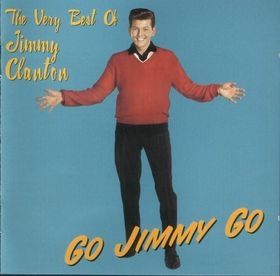 As previously noted, the Carpenters had a way of appropriating songs first recorded by other people. In part, this owes to an astuteness in often picking songs that weren’t very well known. Once Richard Carpenter imprinted his imaginative arrangements and Karen her marvellous vocals on such a song, it almost invariably was theirs. And so it was with Hurting Each Other, which the siblings recorded in late 1971 (apparently a news segment filmed them putting down the backing vocal track). It appeared on their excellent 1972 album, A Song For You, and the single reached #2 on the US charts.
As previously noted, the Carpenters had a way of appropriating songs first recorded by other people. In part, this owes to an astuteness in often picking songs that weren’t very well known. Once Richard Carpenter imprinted his imaginative arrangements and Karen her marvellous vocals on such a song, it almost invariably was theirs. And so it was with Hurting Each Other, which the siblings recorded in late 1971 (apparently a news segment filmed them putting down the backing vocal track). It appeared on their excellent 1972 album, A Song For You, and the single reached #2 on the US charts.
Hurting Each Other was written by Gary Geld and Peter Udell, whose songwriting credits also included Brian Hyland’s Sealed With A Kiss. The first recording of the song was released in 1965 by teen idol Jimmy Clanton, a white R&B singer from Baton Rouge who had a string of hits (including Neil Sedaka’s composition Venus In Blue Jeans) in what has been called “swamp pop” and then faded into the sort of obscurity that has nonetheless ensured a performing career that continues to this day, complemented by a line in radio DJing.
Also recorded by: Chad Allan & The Expressions ( who would become Guess Who,1965); Walker Brothers (1966), Ruby & The Romantics (1969), Peter Nero (1972), Percy Faith & His Orchestra (1972), Ray Conniff and The Singers (1972), Johnette Napolitano with Marc Moreland (1994), Stan Whitmire (2000)
—————
Mick Jackson – Blame It On The Boogie.mp3
The Jacksons – Blame It On The Boogie.mp3
Loo & Placido – Should I Stay Or Should I Boogie.mp3
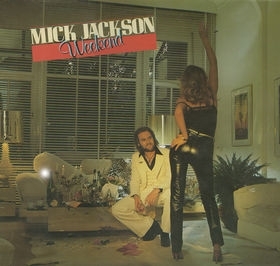 How many cover versions have been sung by the namesake of the original performer? Mick Jackson was a German-born English pop singer. His Blame It On The Boogie, which he also co-wrote, sounds like a presentable Leo Sayer number. The Jacksons changed little in the song’s structure — Mick’s original has all the touches we know well, such as the “sunshine, moonlight, good time, boogie” interlude — and yet they turned a pretty good song into a disco explosion of joy, presaging Michael’s Off TheWall a year and a bit later.
How many cover versions have been sung by the namesake of the original performer? Mick Jackson was a German-born English pop singer. His Blame It On The Boogie, which he also co-wrote, sounds like a presentable Leo Sayer number. The Jacksons changed little in the song’s structure — Mick’s original has all the touches we know well, such as the “sunshine, moonlight, good time, boogie” interlude — and yet they turned a pretty good song into a disco explosion of joy, presaging Michael’s Off TheWall a year and a bit later.
Mick Jackson actually wrote the song with Stevie Wonder in mind (and it’s easy to imagine how it might have sounded), but was persuaded by a German label to record it himself. When the freshly minted record was played at a music festival in Cannes, a rep for the Jackson — no doubt alerted by the performer’s name — secretly taped the song, flew it to the US and had the Jackson brothers record and release it in quick time, to release it before Mick could have a hit with it. With both singles out at the same time, the British press had some fun with the Jackson “Battle of the Boogie”. Mick’s single reached #15 in the UK and #61 in the US. The Jacksons’ version became the classic.
The song made a comeback in South Africa in 2003 in a version by a 13-year-old Danish character called Jay-Kid. That version was used in Loo & Placido’s rather splendid 2005 mash-up with the Clash’s Should I Stay Or Should I Go, titled Should I Stay Or Should I Boogie?
Also recorded by: Rita Pavone (1979), Big Fun (1989), Fat Boy Slim (as Blame It On The Baseline, 1989), Luis Miguel (as Será que no me amas, 1990), Dynamo’s Rhythm Aces (1999), Jay-Kid (2003), Captain Jack (2003), Marcia Hines (2006)
—————
The Four Lads – Istanbul (Not Constantinople).mp3
They Might Be Giants – Istanbul (Not Constantinople).mp3
 It casts a reflection of some kind on They Might Be Giants that many people believe the novelty number Istanbul (Not Constantinople) to be their original. It is, in fact, an old swing number from the 1950s written — borrowing copiously from Putting On The Ritz — by Nat Simons and Jimmy Arnold, the latter frontman of Canadian singing quartet the Four Lads. The song was the group’s breakthrough hit in 1953, and they had enough of a career to enable a reconstituted version of the group to trawl the nostalgia circuit.
It casts a reflection of some kind on They Might Be Giants that many people believe the novelty number Istanbul (Not Constantinople) to be their original. It is, in fact, an old swing number from the 1950s written — borrowing copiously from Putting On The Ritz — by Nat Simons and Jimmy Arnold, the latter frontman of Canadian singing quartet the Four Lads. The song was the group’s breakthrough hit in 1953, and they had enough of a career to enable a reconstituted version of the group to trawl the nostalgia circuit.
They Might Be Giants recorded their faster cover version in 1989, drawing from the klezmer style of secular Jewish music to get that Middle Eastern effect (hey, they are Americans…). One may assume that the song would cause some perplexity in Greece, where the Turkish city on the Bosphorus is referred to as Constantinople. (Thanks to Philip)
Also recorded by: The Radio Revellers (1953), Frankie Vaughan (1954), Caterina Valente (1954), Santo & Johnny (1962), Edmundo Ros (1953), Al Caiola (1962), Bette Midler (1977), The Residents (1987), The Sacados (1990), Mad Dodo (1992), Chris Potter & Kenny Werner (1994), Trevor Horn Orchestra (2003), Reggie’s Red Hot Feetwarmers (2005), Ska Cubano (2006), Ayhan Sicimoğlu (2006)
—————
Joe South – Rose Garden.mp3
Lynn Anderson – Rose Garden.mp3
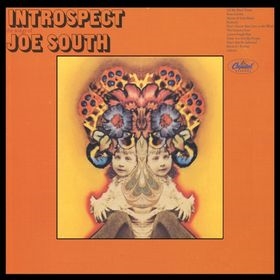 Once upon a time, I hated the song as being representative of everything I loathed about country music. I still didn’t like it when I saw the light and embraced the genre, for Anderson’s hit record is rather naff. Then I heard Joe South’s version, and it became clear to me just how good a song it is. Alas, a few weeks ago I watched an audition for South Africa’s Idols show during which a spectacularly untalented woman performed the song she retitled “Ahr Burk Yurr Pahrrdynn”, singing it aggressively out of tune and with no regard to the correct lyrics. It is her tragicomic version which I now hear, alas, when I think of the song.
Once upon a time, I hated the song as being representative of everything I loathed about country music. I still didn’t like it when I saw the light and embraced the genre, for Anderson’s hit record is rather naff. Then I heard Joe South’s version, and it became clear to me just how good a song it is. Alas, a few weeks ago I watched an audition for South Africa’s Idols show during which a spectacularly untalented woman performed the song she retitled “Ahr Burk Yurr Pahrrdynn”, singing it aggressively out of tune and with no regard to the correct lyrics. It is her tragicomic version which I now hear, alas, when I think of the song.
In the three years before Lynn Anderson got around to scoring a hit with it in 1971, Rose Garden had been recorded by a soul singer (Dobie Gray), another country singer (Glen Campbell) and three easy listening merchants (Ray Conniff, Ronnie Aldrich and His Two Pianos, and Boots Randolph, under his almost real name Homer Louis Randolph III). For Joe South it was just an album track. He’d have a hit later with Games People Play, and wrote a couple of hits for Billie Joe Royal (Down in the Boondocks and Hush, which would become a Deep Purple classic), The Osmonds and Elvis.
Lynn Anderson almost did not record the song. Execs at her record company, Columbia, didn’t like it much and thought it inappropriate for a woman to sing a song which represents a male perspective (for example in the line “I could promise you things like big diamond rings”). As it happened, there was some spare time during a studio session, and the track was recorded. The label’s micro-managing head, Clive Davis, heard it and decided that it should be Anderson’s next single. It was a big hit in the US and Europe, and Anderson’s version remained the biggest selling recording by any female country artist until 1997.
Also recorded by: Dobie Gray (1969), Glen Campbell (1971), Homer Louis Randolph III (1971), Ray Conniff (1971), Ronnie Aldrich and His Two Pianos (1971), Peter Horton (with German lyrics, 1971), Johnny Mathis (1971), Loretta Lynn (1971), New World (1971), Andy Williams (1971), Dottie West (1971), The Fevers (as Mar de Rosas, 1971), Claude François (as Je te demande pardon, 1971), Bakersfield California Brass (1972), k.d. lang (1986), Kon Kan (1989), Suicide Machines (2000), Tamra Rosanes (2002), Socks (2004), Martina McBride (2005), Southern Culture on the Skids (2007), Aldebert (as Je te demande pardon, 2008)
More Originals
 I posted a mix of songs about being in love last year, for Valentine’s Day, with a view to facilitating loads of romantic seductions (or something). That mix got deleted by ZShare. Responding to a request, I have revised the tracklisting, dropping a few songs, adding a few new, changing the track order. The Jonatha Brooke song I owe to Barely Awake In Frog Pajamas blog. So here is Any Major Love Mix Vol. 2.
I posted a mix of songs about being in love last year, for Valentine’s Day, with a view to facilitating loads of romantic seductions (or something). That mix got deleted by ZShare. Responding to a request, I have revised the tracklisting, dropping a few songs, adding a few new, changing the track order. The Jonatha Brooke song I owe to Barely Awake In Frog Pajamas blog. So here is Any Major Love Mix Vol. 2.



 I am recycling this incredibly moving song from last year. It seems to have been very popular indeed, even though it was a mere album track from an album that was not a big hit even in Karma-Ann Swanepoel’s home country, South Africa. Karma has found someone with whom to connect on an intimate level. As the alert reader might have predicted, there is something that makes this love impossible. They have been talking a lot, always skirting around their true feelings: “So we’ll talk every now and then about our day-to-day, never saying the things we both planned to say.”
I am recycling this incredibly moving song from last year. It seems to have been very popular indeed, even though it was a mere album track from an album that was not a big hit even in Karma-Ann Swanepoel’s home country, South Africa. Karma has found someone with whom to connect on an intimate level. As the alert reader might have predicted, there is something that makes this love impossible. They have been talking a lot, always skirting around their true feelings: “So we’ll talk every now and then about our day-to-day, never saying the things we both planned to say.” The song reflects the experiences of two female friends who are presently conversing. One has an affair with a married man who promises to leave his wife and join her in California. The other is in a difficult marriage – it seems she married her husband only because she felt her “time was running out”. But now that she is pregnant, she seems to love him (or so she says). “But now you love him and your baby; at last you are complete. But he’s distant and you found him on the phone, pleading, saying: ‘Baby, I love you, and I’ll leave her and I’m coming out to California”. Ooops! Obviously the husband is in love with the first woman, who loves him too. And the geometry of the relationships will be further complicated when the love triangle turns into a square soon. Woman #1 realises what will happen: “And your husband will never leave you. He will never leave you for me.” An impossible love for at least two people here, beautifully dramatised by the gorgeous Jenny Lewis.
The song reflects the experiences of two female friends who are presently conversing. One has an affair with a married man who promises to leave his wife and join her in California. The other is in a difficult marriage – it seems she married her husband only because she felt her “time was running out”. But now that she is pregnant, she seems to love him (or so she says). “But now you love him and your baby; at last you are complete. But he’s distant and you found him on the phone, pleading, saying: ‘Baby, I love you, and I’ll leave her and I’m coming out to California”. Ooops! Obviously the husband is in love with the first woman, who loves him too. And the geometry of the relationships will be further complicated when the love triangle turns into a square soon. Woman #1 realises what will happen: “And your husband will never leave you. He will never leave you for me.” An impossible love for at least two people here, beautifully dramatised by the gorgeous Jenny Lewis.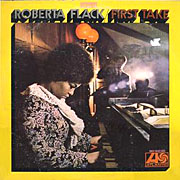 The obstacle of the age gap was explored by Gary Puckett in his anthem to narrowly but judiciously avoided statutory rape. We don’t know how old Gary was vis-a-vis the young girl, but in Roberta Flack’s lovely song from her 1969 debut album, First Take, the relationship is between two consenting adults. The age difference here seems to be too vast to reconcile. I have difficulty buying into that: she is 21, he is 34. That’s just 13 years (and the 21-year-old girl is probably more mature than the guy). But, as Roberta tells it, “now I find according to society that our ages, they must keep us apart.” She rightly believes that the age difference is immaterial when the two of them are so much in love, “a love too strong for gossip to kill”. But gossip seems to be winning; her man unreasonably a hostage to parochial prejudices. So Roberta has to put an ultimatum to him: “What will it be – our ages or our hearts?”
The obstacle of the age gap was explored by Gary Puckett in his anthem to narrowly but judiciously avoided statutory rape. We don’t know how old Gary was vis-a-vis the young girl, but in Roberta Flack’s lovely song from her 1969 debut album, First Take, the relationship is between two consenting adults. The age difference here seems to be too vast to reconcile. I have difficulty buying into that: she is 21, he is 34. That’s just 13 years (and the 21-year-old girl is probably more mature than the guy). But, as Roberta tells it, “now I find according to society that our ages, they must keep us apart.” She rightly believes that the age difference is immaterial when the two of them are so much in love, “a love too strong for gossip to kill”. But gossip seems to be winning; her man unreasonably a hostage to parochial prejudices. So Roberta has to put an ultimatum to him: “What will it be – our ages or our hearts?” The 1978 original of Whitney Houston’s 1985 hit by the one-time singer of the 5th Dimension. It is, of course, another adultery song (which I think is used better here than in the cheating songs instalment). Naturally, the arrangement of clandestinely banging a married man is not ideal, but she really seems to love him, and, one suspects, he really loves her too, believing that this in itself would justify ending his marriage. “You used to tell me we’d run away together. Love gives you the right to be free.” But she knows that he doesn’t really believe this to be true, that he cannot sacrifice his marital obligation on the altar of love. “You said be patient, just wait a little longer – but that’s just an old fantasy.” So, is he a cheating cad who is just using Marilyn? Or is he in a desperate situation in which at least two – and if his wife finds out possibly three – hearts are broken?
The 1978 original of Whitney Houston’s 1985 hit by the one-time singer of the 5th Dimension. It is, of course, another adultery song (which I think is used better here than in the cheating songs instalment). Naturally, the arrangement of clandestinely banging a married man is not ideal, but she really seems to love him, and, one suspects, he really loves her too, believing that this in itself would justify ending his marriage. “You used to tell me we’d run away together. Love gives you the right to be free.” But she knows that he doesn’t really believe this to be true, that he cannot sacrifice his marital obligation on the altar of love. “You said be patient, just wait a little longer – but that’s just an old fantasy.” So, is he a cheating cad who is just using Marilyn? Or is he in a desperate situation in which at least two – and if his wife finds out possibly three – hearts are broken? Ouch, she fell hard – “You make me feel like a lilting girl. What do you do to me?” – but is trapped in another relationship. “Now what am I supposed to do when I want you in my world? How can I want you for myself when I’m already someone’s girl?” For Erykah, extra-curricular activity, which her object of desire seems to be proposing, is not an option: “I know I’m a lot of woman, but not enough to divide the pie.” So it won’t happen; they cannot be together, ever. Forever ever? Well, the idea of brutal finality might be just a little too much for Erykah to bear, so she makes a deal: they’ll be together in the next lifetime. “I guess I’ll see you next lifetime. I’m going to look for you.” Which must bring modest comfort to the atheist lover.
Ouch, she fell hard – “You make me feel like a lilting girl. What do you do to me?” – but is trapped in another relationship. “Now what am I supposed to do when I want you in my world? How can I want you for myself when I’m already someone’s girl?” For Erykah, extra-curricular activity, which her object of desire seems to be proposing, is not an option: “I know I’m a lot of woman, but not enough to divide the pie.” So it won’t happen; they cannot be together, ever. Forever ever? Well, the idea of brutal finality might be just a little too much for Erykah to bear, so she makes a deal: they’ll be together in the next lifetime. “I guess I’ll see you next lifetime. I’m going to look for you.” Which must bring modest comfort to the atheist lover. Here we have two people who are in love, but geographical distance is coming between them. “I find the map and draw a straight line over rivers, farms, and state lines; the distance from A to where you’d be…” He and she, for it is a duet with Loudon’s daughter (ergo Rufus’ sister), are feeling depressed about it all. “I’m miles from where you are, I lay down on the cold ground. I pray that something picks me up, and sets me down in your warm arms.” Unlike many others in the impossible love predicament, our two friends may well activate their love fully when they do get together. And in their imagination, they already are: “After I have travelled so far, we’d set the fire to the third bar. We’d share each other like an island until exhausted close our eyelids.” Can the promise of sweaty sex compensate for the agony of separation?
Here we have two people who are in love, but geographical distance is coming between them. “I find the map and draw a straight line over rivers, farms, and state lines; the distance from A to where you’d be…” He and she, for it is a duet with Loudon’s daughter (ergo Rufus’ sister), are feeling depressed about it all. “I’m miles from where you are, I lay down on the cold ground. I pray that something picks me up, and sets me down in your warm arms.” Unlike many others in the impossible love predicament, our two friends may well activate their love fully when they do get together. And in their imagination, they already are: “After I have travelled so far, we’d set the fire to the third bar. We’d share each other like an island until exhausted close our eyelids.” Can the promise of sweaty sex compensate for the agony of separation?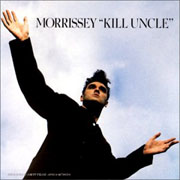 As the title suggests, Morrissey and his pal’s girlfriend are in a car, but instead of dreaming about double-decker busses, Morrissey is engaged in a conversation punctuated by directions. It turns out that she is not really happy with Morrissey’s pal. “So how did I end up so deeply involved in the very existence I planned on avoiding?” Morrissey has no answer, for he can’t run his mate down in a quest for this girl. She instructs him to drive on, and he does. There is an obvious attraction. Eventually they get to her place. Will she invite him up for “a cup of coffee”? Would he accept such a suggestion? In the event, she doesn’t though she probably was tempted to, and with what seems like profound regret, Morrissey notes: “I’m parking outside her home. And we’re shaking hands ‘Goodnight’, so politely.”
As the title suggests, Morrissey and his pal’s girlfriend are in a car, but instead of dreaming about double-decker busses, Morrissey is engaged in a conversation punctuated by directions. It turns out that she is not really happy with Morrissey’s pal. “So how did I end up so deeply involved in the very existence I planned on avoiding?” Morrissey has no answer, for he can’t run his mate down in a quest for this girl. She instructs him to drive on, and he does. There is an obvious attraction. Eventually they get to her place. Will she invite him up for “a cup of coffee”? Would he accept such a suggestion? In the event, she doesn’t though she probably was tempted to, and with what seems like profound regret, Morrissey notes: “I’m parking outside her home. And we’re shaking hands ‘Goodnight’, so politely.” I’ll cheat and use the same text as I did last year. Welsh songbird Jem usually does the electronica thing, but here she is in ballad mode. And what a sad ballad it is, continuing the close-but-not-close-enough riff of Pachelbel. “I know that we can’t be together, but I just like to dream. It’s so strange the way our paths have crossed, how we were brought together.” The wonder of love desperately seeks physical expression, but even though she’d “love to spend the night”, she “can’t pay the price”, even if they are “so close to giving in”. The realisation arrives: “I know there’s no such thing as painless love…we can never win.” And still, in the next line Jem reiterates just how giddy this impossible love makes her — it makes her “flying high”.
I’ll cheat and use the same text as I did last year. Welsh songbird Jem usually does the electronica thing, but here she is in ballad mode. And what a sad ballad it is, continuing the close-but-not-close-enough riff of Pachelbel. “I know that we can’t be together, but I just like to dream. It’s so strange the way our paths have crossed, how we were brought together.” The wonder of love desperately seeks physical expression, but even though she’d “love to spend the night”, she “can’t pay the price”, even if they are “so close to giving in”. The realisation arrives: “I know there’s no such thing as painless love…we can never win.” And still, in the next line Jem reiterates just how giddy this impossible love makes her — it makes her “flying high”.

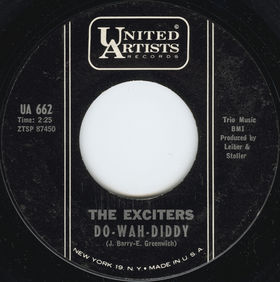 It was a huge hit for the unlikeliest pop star ever to emerge from Johannesburg (yeah, I know, Mr Lubowitz’s stage name applied to the whole band). But a year before that, in 1963, it was recorded, minus a diddy, by a soul girl group which never enjoyed as much success as it deserved. The Exciters are remembered mainly for their single big hit, the Bert Berns composition Tell Him.
It was a huge hit for the unlikeliest pop star ever to emerge from Johannesburg (yeah, I know, Mr Lubowitz’s stage name applied to the whole band). But a year before that, in 1963, it was recorded, minus a diddy, by a soul girl group which never enjoyed as much success as it deserved. The Exciters are remembered mainly for their single big hit, the Bert Berns composition Tell Him. In Motown’s happy family it was common that the same songs would be recorded by different artists. Sometimes, that custom would result in two chart-toppers within a year, as in the case of I Heard It Through The Grapevine
In Motown’s happy family it was common that the same songs would be recorded by different artists. Sometimes, that custom would result in two chart-toppers within a year, as in the case of I Heard It Through The Grapevine  While the Temptations scored with the Undisputed Truth’s song, Edwin Starr had a hit with a Temps song, War. The anti-Vietnam protest song appeared originally on the Temptations 1970 Psychedelic Shack album. By popular request, Motown decided to release it as a single, but not by the Temptations, because the label did not want to associate its big stars with political causes. Indeed, the Temptations themselves were apprehensive about offending some of their fans (though exactly why anybody who would dig the drug-friendly psychedelic grooves of early-’70s Temptations might be offended by an anti-war sentiment is a mystery). So Motown gave the song to a relative unknown who two years earlier had enjoyed his solitary hit. Edwin Starr’s anthemic, fist-raising version was far more fierce and furious than that of Temptations. Catching the zeitgeist, Starr’s War was a US #1 hit. And guess who appears on the backing track? The Undisputed Truth.
While the Temptations scored with the Undisputed Truth’s song, Edwin Starr had a hit with a Temps song, War. The anti-Vietnam protest song appeared originally on the Temptations 1970 Psychedelic Shack album. By popular request, Motown decided to release it as a single, but not by the Temptations, because the label did not want to associate its big stars with political causes. Indeed, the Temptations themselves were apprehensive about offending some of their fans (though exactly why anybody who would dig the drug-friendly psychedelic grooves of early-’70s Temptations might be offended by an anti-war sentiment is a mystery). So Motown gave the song to a relative unknown who two years earlier had enjoyed his solitary hit. Edwin Starr’s anthemic, fist-raising version was far more fierce and furious than that of Temptations. Catching the zeitgeist, Starr’s War was a US #1 hit. And guess who appears on the backing track? The Undisputed Truth. Few noises in mainstream pop history have been as disturbing as Joe Cocker’s croaked note at the end of that staple of soppy love songs, You Are So Beautiful. Some people might regard the song best crooned by Homer Simpson, but they are probably not familiar with Billy Preston’s rather good original. The song was written by Preston and his songwriting partner Bruce Fisher, with Beach Boy Dennis Wilson’s uncredited lyrical contribution (Wilson would sing the song as an encore at Beach Boys gigs in the late ’70s and early ’80s). Preston’s version was recorded shortly before Cocker’s slower version in 1974. The former remained an album track, while Cocker’s version reached the US #5 in 1975 (but didn’t chart at all Britain).
Few noises in mainstream pop history have been as disturbing as Joe Cocker’s croaked note at the end of that staple of soppy love songs, You Are So Beautiful. Some people might regard the song best crooned by Homer Simpson, but they are probably not familiar with Billy Preston’s rather good original. The song was written by Preston and his songwriting partner Bruce Fisher, with Beach Boy Dennis Wilson’s uncredited lyrical contribution (Wilson would sing the song as an encore at Beach Boys gigs in the late ’70s and early ’80s). Preston’s version was recorded shortly before Cocker’s slower version in 1974. The former remained an album track, while Cocker’s version reached the US #5 in 1975 (but didn’t chart at all Britain). Of course, this is not so much the story of an orignal and its cover as the unhappy tale of a sample and greed — all revolving around a loop in the Verve song that was lifted from Andrew Look Oldham’s 1966 instrumental adaptation of the Rolling Stones’ The Last Time. Oldham was not only a musician, but also the manager of the Stones in their early pomp. He sold his contract to Allen Klein – has there ever been a more lawyerly name in rock? – in 1966. By 1997, when the Verve’s Urban Hymns album came out, Klein controlled the Stones’ 1960s back catalogue.
Of course, this is not so much the story of an orignal and its cover as the unhappy tale of a sample and greed — all revolving around a loop in the Verve song that was lifted from Andrew Look Oldham’s 1966 instrumental adaptation of the Rolling Stones’ The Last Time. Oldham was not only a musician, but also the manager of the Stones in their early pomp. He sold his contract to Allen Klein – has there ever been a more lawyerly name in rock? – in 1966. By 1997, when the Verve’s Urban Hymns album came out, Klein controlled the Stones’ 1960s back catalogue.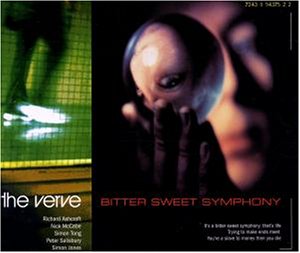 It can be argued that Jagger and Richards didn’t even write the song from which Ashcroft didn’t sample; The Last Time was based (or ripped off, if you are feeling less than overly charitable) on a 1950s recording by the Staple Singers of almost exactly the same title, This May Be The Last Time. It’s a shame the Staple Singers didn’t think to sue… And just to turn this sorry tale into a real farce, when Bitter Sweet Symphony was nominated for two Grammys, the credit went to Jagger and Richards as writers and the Andrew Oldham Orchestra as artists.
It can be argued that Jagger and Richards didn’t even write the song from which Ashcroft didn’t sample; The Last Time was based (or ripped off, if you are feeling less than overly charitable) on a 1950s recording by the Staple Singers of almost exactly the same title, This May Be The Last Time. It’s a shame the Staple Singers didn’t think to sue… And just to turn this sorry tale into a real farce, when Bitter Sweet Symphony was nominated for two Grammys, the credit went to Jagger and Richards as writers and the Andrew Oldham Orchestra as artists. This entirely gorgeous song is not about the death of a love interest, but about that of Melissa’s sister in a car crash. The sisterly love must have been profound — as deep as that of romantic lovers (which is why this song works for them too). “My silence solidifies, until that hollow void erases you so I can’t feel at all. But if I never feel again, at least that nothingness will end the painful dream, of you and me…”
This entirely gorgeous song is not about the death of a love interest, but about that of Melissa’s sister in a car crash. The sisterly love must have been profound — as deep as that of romantic lovers (which is why this song works for them too). “My silence solidifies, until that hollow void erases you so I can’t feel at all. But if I never feel again, at least that nothingness will end the painful dream, of you and me…” Ben Fold in his song The Luckiest – possibly the greatest love song ever written – tells the story about his neighbour, an “old man who lived to his 90s” and one day dies in his sleep. His wife lives on for a couple of days and then follows him. The notion of not being able to live without a loved one is the point of this song, performed by a singer much younger than 90. He sets out his stall early: “Love of mine, some day you will die. But I’ll be close behind, I’ll follow you into the dark.” There are hints of suicide should the tragic moment come, and that point may be imminent, suggesting the presence of a terminal illness. “You and me have seen everything to see from Bangkok to Calgary, and the soles of your shoes are all worn down. The time for sleep is now. It’s nothing to cry about, ’cause we’ll hold each other soon – the blackest of rooms.”
Ben Fold in his song The Luckiest – possibly the greatest love song ever written – tells the story about his neighbour, an “old man who lived to his 90s” and one day dies in his sleep. His wife lives on for a couple of days and then follows him. The notion of not being able to live without a loved one is the point of this song, performed by a singer much younger than 90. He sets out his stall early: “Love of mine, some day you will die. But I’ll be close behind, I’ll follow you into the dark.” There are hints of suicide should the tragic moment come, and that point may be imminent, suggesting the presence of a terminal illness. “You and me have seen everything to see from Bangkok to Calgary, and the soles of your shoes are all worn down. The time for sleep is now. It’s nothing to cry about, ’cause we’ll hold each other soon – the blackest of rooms.”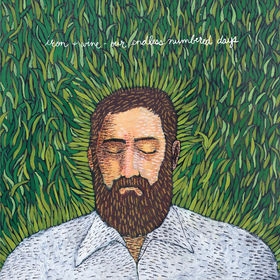 Musically and lyrically a companion piece to I’ll Follow You Into The Dark, Sam Beam is pondering the death of a lover: “One of us will die inside these arms. Eyes wide open, naked as we came, one will spread our ashes ’round the yard.” The instructions have been given: cremation, no burial, just scatter the ashes. “She says, ‘If I leave before you, darling, don’t you waste me in the ground.”
Musically and lyrically a companion piece to I’ll Follow You Into The Dark, Sam Beam is pondering the death of a lover: “One of us will die inside these arms. Eyes wide open, naked as we came, one will spread our ashes ’round the yard.” The instructions have been given: cremation, no burial, just scatter the ashes. “She says, ‘If I leave before you, darling, don’t you waste me in the ground.” Swedish songbird Ternheim rounds off the trilogy of not wanting to live when the other has died. The twist here seems to be that she wants to be in death with someone whom she could not be with in life. “Maybe I could be yours, maybe you could be mine. God, I waited so long, maybe my time has come to walk by your side. Please put me at ease, now my soul is ready for peace.” Which is a twist on the saying, “See you in the next life.”
Swedish songbird Ternheim rounds off the trilogy of not wanting to live when the other has died. The twist here seems to be that she wants to be in death with someone whom she could not be with in life. “Maybe I could be yours, maybe you could be mine. God, I waited so long, maybe my time has come to walk by your side. Please put me at ease, now my soul is ready for peace.” Which is a twist on the saying, “See you in the next life.”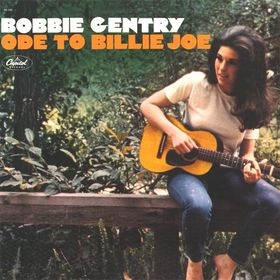 This song can be interpreted in several ways. We know that Billy Joe MacAllister committed suicide by jumping off the Tallahatchie Bridge on Choctaw Ridge. For Bobbie’s family it seems to be the stuff of casual dinner conversation: “Well, Billy Joe never had a lick of sense. Pass the biscuits, please”. And so the conversation goes, except Bobbie seems to have lost her appetite entirely when mother mentions something uncanny: “”That nice young preacher, Brother Taylor, dropped by today. Said he’d be pleased to have dinner on Sunday. Oh, by the way, he said he saw a girl that looked a lot like you up on Choctaw Ridge, and she and Billy Joe was throwing somethin’ off the Tallahatchie Bridge.”
This song can be interpreted in several ways. We know that Billy Joe MacAllister committed suicide by jumping off the Tallahatchie Bridge on Choctaw Ridge. For Bobbie’s family it seems to be the stuff of casual dinner conversation: “Well, Billy Joe never had a lick of sense. Pass the biscuits, please”. And so the conversation goes, except Bobbie seems to have lost her appetite entirely when mother mentions something uncanny: “”That nice young preacher, Brother Taylor, dropped by today. Said he’d be pleased to have dinner on Sunday. Oh, by the way, he said he saw a girl that looked a lot like you up on Choctaw Ridge, and she and Billy Joe was throwing somethin’ off the Tallahatchie Bridge.” Apparently written about a 9/11 victim, singer-songwriter Ari Hest does what most grieving people do when confronted with a sudden, unnatural death – asking why. And for those with religious faith, it can be shaken by such an event, as seems to be the case here. “I can ask all I please, I can beg down on my knees, for a reason, for a sign. But these answers I won’t find.” So instead, “I’ll go on without you, and what’s left for me to do but to stay where I am in my world of pretend.”
Apparently written about a 9/11 victim, singer-songwriter Ari Hest does what most grieving people do when confronted with a sudden, unnatural death – asking why. And for those with religious faith, it can be shaken by such an event, as seems to be the case here. “I can ask all I please, I can beg down on my knees, for a reason, for a sign. But these answers I won’t find.” So instead, “I’ll go on without you, and what’s left for me to do but to stay where I am in my world of pretend.”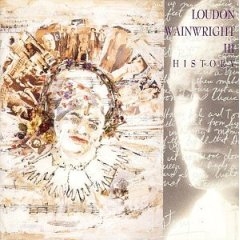 The song starts off unpromisingly as Loudon sets the scene: “Sometimes I forget that you’ve gone. You’ve gone, and you’re not coming back.” But we quickly learn that he has not been dumped as he surveys the scene: “And your bookcase still holds all your books; it’s as if all you’ve done is go out of town…” The addressee could be returning any minute now, but the person — my guess it’s his father, so let’s identify him as such —never went on a journey. “But your suitcase is empty, it’s right here in the hall. That’s not even the strangest thing. Why would you leave your wallet behind. Your glasses, your wristwatch and ring.” He has unresolved issues with his father, having failed to say what needed to be said. Death creates a distance, but Loudon feels his father’s proximity. “You’re not far away, you’re near. Sometimes I forget that you’ve gone. Sometimes it feels like you’re right here. Right now it feels like you’re right here.” Wainwright does not specify the nature of his relationship to the deceased, so it can be applied, at least in spirit, to a separation by death of any loved one.
The song starts off unpromisingly as Loudon sets the scene: “Sometimes I forget that you’ve gone. You’ve gone, and you’re not coming back.” But we quickly learn that he has not been dumped as he surveys the scene: “And your bookcase still holds all your books; it’s as if all you’ve done is go out of town…” The addressee could be returning any minute now, but the person — my guess it’s his father, so let’s identify him as such —never went on a journey. “But your suitcase is empty, it’s right here in the hall. That’s not even the strangest thing. Why would you leave your wallet behind. Your glasses, your wristwatch and ring.” He has unresolved issues with his father, having failed to say what needed to be said. Death creates a distance, but Loudon feels his father’s proximity. “You’re not far away, you’re near. Sometimes I forget that you’ve gone. Sometimes it feels like you’re right here. Right now it feels like you’re right here.” Wainwright does not specify the nature of his relationship to the deceased, so it can be applied, at least in spirit, to a separation by death of any loved one.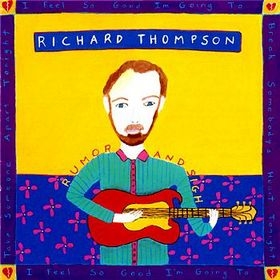 Turning the teen death genre (which we’ll turn to in the next item) on its head a little, Thompson tells the story of an outlaw in love. James Adie, a criminal, and Red Molly fell in love over the eponymous motorbike. Then the day comes that James robs a bank and is shot by the police. Red Molly is called to his deathbed. James declares his love for Molly and the bike, then “he reached for her hand and he slipped her the keys, saying: ‘I’ve got no further use for these. I see angels on Ariels in leather and chrome swooping down from heaven to carry me home’. And he gave her one last kiss and died, and he gave her his Vincent to ride.”
Turning the teen death genre (which we’ll turn to in the next item) on its head a little, Thompson tells the story of an outlaw in love. James Adie, a criminal, and Red Molly fell in love over the eponymous motorbike. Then the day comes that James robs a bank and is shot by the police. Red Molly is called to his deathbed. James declares his love for Molly and the bike, then “he reached for her hand and he slipped her the keys, saying: ‘I’ve got no further use for these. I see angels on Ariels in leather and chrome swooping down from heaven to carry me home’. And he gave her one last kiss and died, and he gave her his Vincent to ride.” I promised that we’d end off with a much-needed laugh. The early ’60s were a fertile period for teen death songs such as The Leader Of The Pack, Tell Laura I Love Her, Teen Angel, Dead Man’s Curve, Run Joey Run, and Ebony Eyes. Jimmy Cross’ 1964 song is a parody that moves swiftly from the ridiculous to the bizarre.
I promised that we’d end off with a much-needed laugh. The early ’60s were a fertile period for teen death songs such as The Leader Of The Pack, Tell Laura I Love Her, Teen Angel, Dead Man’s Curve, Run Joey Run, and Ebony Eyes. Jimmy Cross’ 1964 song is a parody that moves swiftly from the ridiculous to the bizarre. In 1965, Chad & Jeremy were a popular English folk-rock duo when Jeremy Clyde met the songwriter of promising newcomers Simon & Garfunkel at a party for Bob Dylan. Paul Simon was delighted to be asked to play some of his songs for the folk star, and proceeded to play 18 tracks, many of them future classics. One song in particular, Homeward Bound, appealed to Jeremy, and he recorded it with Chad Stuart in London on 26 November 1965 (with Simon dropping in during the session). A few weeks later, in December, Simon & Garfunkel got around to recording their own version of the song which Paul Simon had started writing while stuck at Widnes station (or Dutton or Wigan, accounts vary) in northern England.
In 1965, Chad & Jeremy were a popular English folk-rock duo when Jeremy Clyde met the songwriter of promising newcomers Simon & Garfunkel at a party for Bob Dylan. Paul Simon was delighted to be asked to play some of his songs for the folk star, and proceeded to play 18 tracks, many of them future classics. One song in particular, Homeward Bound, appealed to Jeremy, and he recorded it with Chad Stuart in London on 26 November 1965 (with Simon dropping in during the session). A few weeks later, in December, Simon & Garfunkel got around to recording their own version of the song which Paul Simon had started writing while stuck at Widnes station (or Dutton or Wigan, accounts vary) in northern England. As previously noted, the Carpenters had a way of appropriating songs first recorded by other people. In part, this owes to an astuteness in often picking songs that weren’t very well known. Once Richard Carpenter imprinted his imaginative arrangements and Karen her marvellous vocals on such a song, it almost invariably was theirs. And so it was with Hurting Each Other, which the siblings recorded in late 1971 (apparently a news segment filmed them putting down the backing vocal track). It appeared on their excellent 1972 album, A Song For You, and the single reached #2 on the US charts.
As previously noted, the Carpenters had a way of appropriating songs first recorded by other people. In part, this owes to an astuteness in often picking songs that weren’t very well known. Once Richard Carpenter imprinted his imaginative arrangements and Karen her marvellous vocals on such a song, it almost invariably was theirs. And so it was with Hurting Each Other, which the siblings recorded in late 1971 (apparently a news segment filmed them putting down the backing vocal track). It appeared on their excellent 1972 album, A Song For You, and the single reached #2 on the US charts. How many cover versions have been sung by the namesake of the original performer? Mick Jackson was a German-born English pop singer. His Blame It On The Boogie, which he also co-wrote, sounds like a presentable Leo Sayer number. The Jacksons changed little in the song’s structure — Mick’s original has all the touches we know well, such as the “sunshine, moonlight, good time, boogie” interlude — and yet they turned a pretty good song into a disco explosion of joy, presaging Michael’s Off TheWall a year and a bit later.
How many cover versions have been sung by the namesake of the original performer? Mick Jackson was a German-born English pop singer. His Blame It On The Boogie, which he also co-wrote, sounds like a presentable Leo Sayer number. The Jacksons changed little in the song’s structure — Mick’s original has all the touches we know well, such as the “sunshine, moonlight, good time, boogie” interlude — and yet they turned a pretty good song into a disco explosion of joy, presaging Michael’s Off TheWall a year and a bit later. It casts a reflection of some kind on They Might Be Giants that many people believe the novelty number Istanbul (Not Constantinople) to be their original. It is, in fact, an old swing number from the 1950s written — borrowing copiously from Putting On The Ritz — by Nat Simons and Jimmy Arnold, the latter frontman of Canadian singing quartet the Four Lads. The song was the group’s breakthrough hit in 1953, and they had enough of a career to enable a reconstituted version of the group to trawl the nostalgia circuit.
It casts a reflection of some kind on They Might Be Giants that many people believe the novelty number Istanbul (Not Constantinople) to be their original. It is, in fact, an old swing number from the 1950s written — borrowing copiously from Putting On The Ritz — by Nat Simons and Jimmy Arnold, the latter frontman of Canadian singing quartet the Four Lads. The song was the group’s breakthrough hit in 1953, and they had enough of a career to enable a reconstituted version of the group to trawl the nostalgia circuit. Once upon a time, I hated the song as being representative of everything I loathed about country music. I still didn’t like it when I saw the light and embraced the genre, for Anderson’s hit record is rather naff. Then I heard Joe South’s version, and it became clear to me just how good a song it is. Alas, a few weeks ago I watched an audition for South Africa’s Idols show during which a spectacularly untalented woman performed the song she retitled “Ahr Burk Yurr Pahrrdynn”, singing it aggressively out of tune and with no regard to the correct lyrics. It is her tragicomic version which I now hear, alas, when I think of the song.
Once upon a time, I hated the song as being representative of everything I loathed about country music. I still didn’t like it when I saw the light and embraced the genre, for Anderson’s hit record is rather naff. Then I heard Joe South’s version, and it became clear to me just how good a song it is. Alas, a few weeks ago I watched an audition for South Africa’s Idols show during which a spectacularly untalented woman performed the song she retitled “Ahr Burk Yurr Pahrrdynn”, singing it aggressively out of tune and with no regard to the correct lyrics. It is her tragicomic version which I now hear, alas, when I think of the song.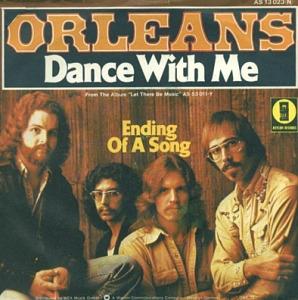
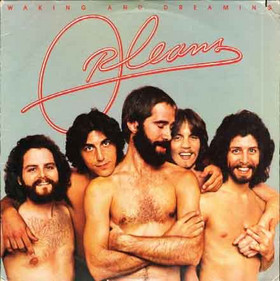

Recent Comments